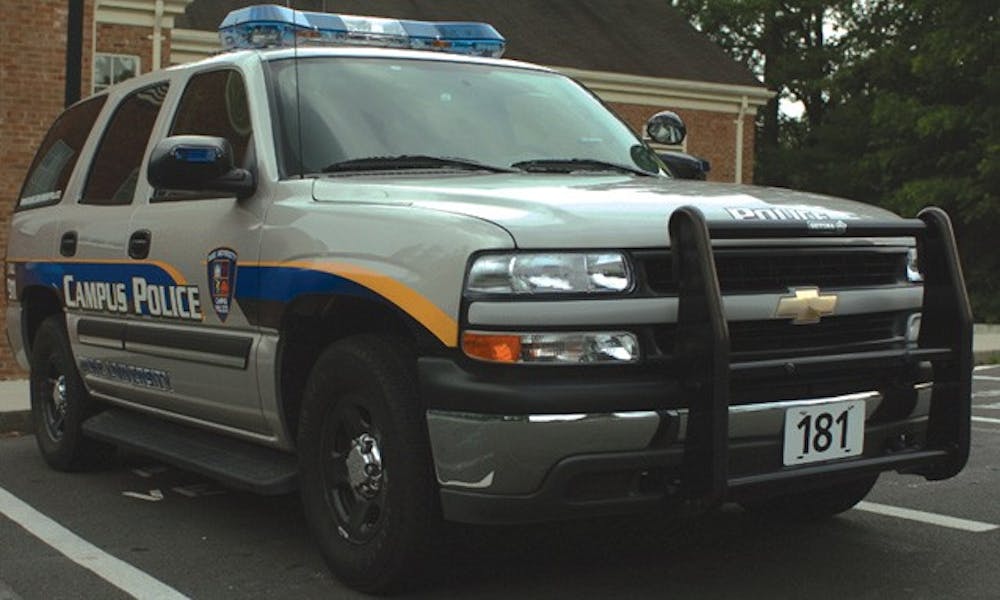Durham lawyers are challenging Duke police officers’ authority to make arrests due to the University’s long-standing religious ties.
Two local attorneys filed a motion Nov. 23 challenging the arrest power of the Duke University Police Department because of the University’s ties to the state United Methodist Church congregation. Defense attorneys Bill Thomas and James Monroe are asking that an October driving-while-impaired arrest be dismissed and that the court suppress all evidence in the case because they claim the Methodist ties are a violation of the separation of church and state.
Sophomore Thomas “Alex” Holloway, 19, was arrested at 3:54 a.m. Oct. 11 at the corner of Ninth and Main streets for driving while impaired and for underage consumption by DUPD officer Doreen Hogan. Holloway’s court date for traffic violations is scheduled for Dec. 13. Holloway declined to comment and Thomas could not be reached for comment Sunday.
Although the case is not being filed directly against Duke, its outcome could challenge the University police force’s arrest power.
But Michael Schoenfeld, vice president for public affairs and government relations, said the case does not pose a substantial threat to the University.
“There is a huge leap between where we are today and DUPD not being able to exist,” Schoenfeld said. “It will continue to be business as usual.”
Duke Police Chief John Dailey could not be reached for comment.
Duke’s legal team is “working closely” with North Carolina Independent Colleges and Universities and has provided information for state and local officials, Schoenfeld added.
The challenge to DUPD’s arrest power was not unexpected given the recent challenge of Davidson College’s arrest power. In an August ruling, the N.C. Court of Appeals reversed a drunk driving arrest made by a Davidson officer on a street adjacent to the campus. The defendant argued that the arrest was unconstitutional due to the college’s ties with the Presbyterian Church.
“We hold that the delegation of police power to Davidson College... is an unconstitutional delegation of ‘an important discretionary governmental power’ to a religious institution in the context of the First Amendment,” the Aug. 17 majority opinion reads.
The N.C. Supreme Court later delayed the enforcement of the appeal’s court ruling because Davidson needs to ensure safety on campus.
The defense of the Davidson police statute, which could be heard by the N.C. Supreme Court as early as January, is being supported by the college, NCICU, the North Carolina Sheriff’s Association and four policing associations, Schoenfeld said.
Davidson College requires that 80 percent of its Board of Trustees and its president be active members of a Christian church. All students must also take a religion course at the college. The Davidson case, however, cannot be used as a precedent in Holloway’s defense because prosecutors have appealed the former to the N.C. Supreme Court.
Still, Thomas indicated that he and other local defense lawyers planned to challenge DUPD’s arrest power, according to an Aug. 18 Herald Sun article.
University bylaws require that the Methodist Church elect 24 of the 37 Board of Trustees members. Thomas also cited the bylaw stating that Duke’s aims are “to assert a faith in the eternal union of knowledge and religion as set forth in the teachings and character of Jesus Christ, the Son of God... to develop a Christian love of freedom and truth ... and to render the largest permanent service to the individual, the state, the nation and the church.”
Thomas also mentioned the Duke Chapel’s central location on campus, the Latin motto translated as “Knowledge and Religion” and the prominence of the Divinity School as reasons why the University violates separation of church and state.
Due to strong religious affiliations, other N.C. colleges have previously been stripped of their police powers and now rely on local police officers to monitor campus safety. Campbell University and Pfeiffer University both lost their policing powers in 1994 and 2002, respectively.
But Schoenfeld said Duke’s historical ties with the Methodist Church are different than the religious affiliation of the other schools.
“The circumstances at Duke are different from the other cases in which this has come up so as to not make this a valid comparison,” he said.
Get The Chronicle straight to your inbox
Signup for our weekly newsletter. Cancel at any time.

